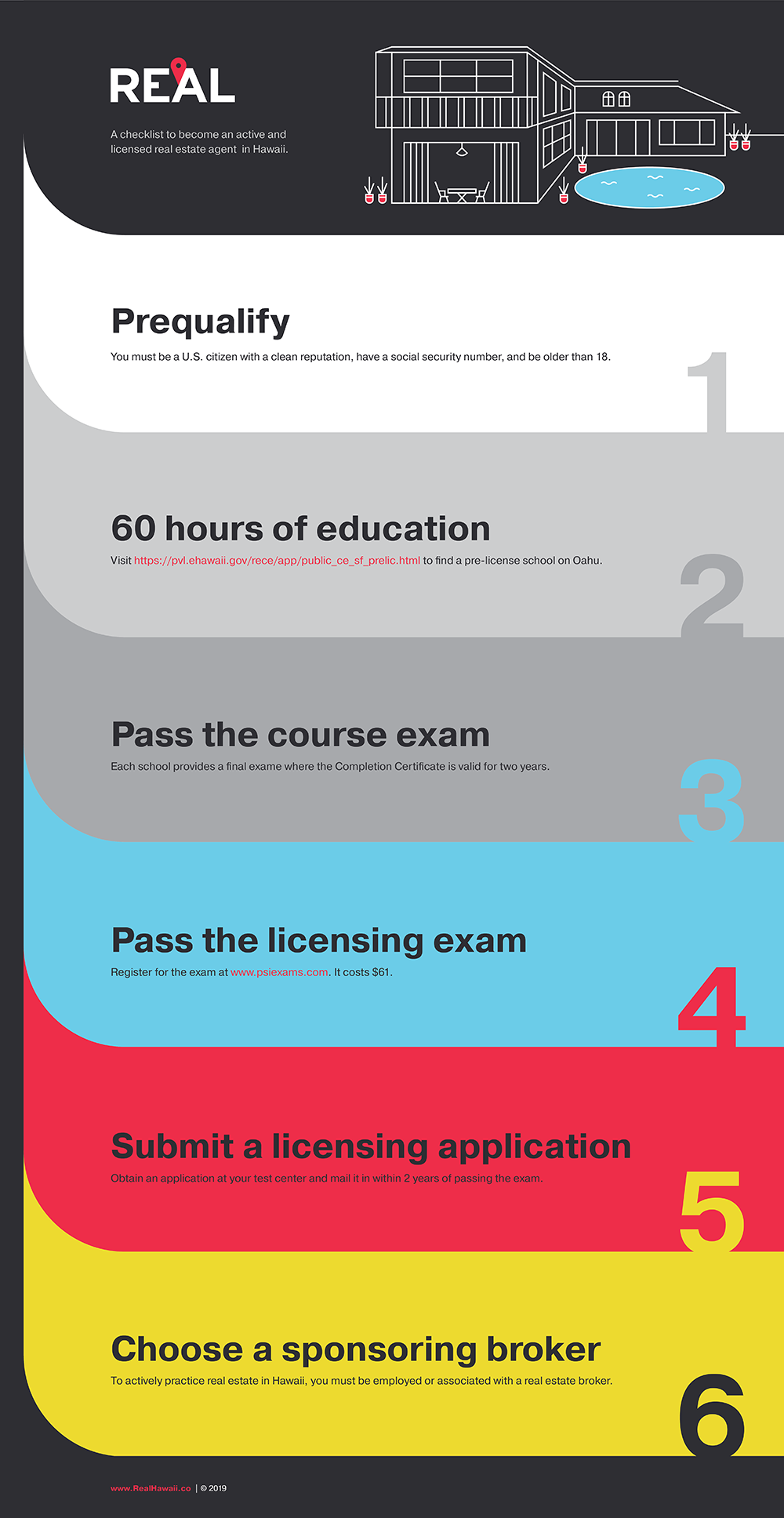
It can be daunting to apply for your real-estate license. It can be done. With a little guidance, you will be able to become a licensed real-estate agent in no time.
There are many things you should know about the process of getting a license. For example, you'll need to complete a prelicensing course and pass an exam. It is also important to disclose your criminal history. You'll need to disclose any arrests or convictions and provide a thorough explanation. There are also reciprocity arrangements that allow you to skip certain steps.
You will need to pass a background screening in addition to the education and testing requirements. This is done by submitting your fingerprints. In addition, you'll need to provide your criminal record information and a court-approved explanation. In most cases, you will have to pay a fee. To pay, you will need to use a credit or debit card. You can pay the fee with a debit card if you have a bank account.

Online prelicensing is available in several states. There are also a few schools that offer training programs. These courses generally cover the basics of real-estate and you'll have to re-learn some basic math concepts from grade school.
In-person classes are also possible. These classes usually last for a few weeks and are often held on weekends. You'll need to be 18 or older and you'll need to have working rights in the U.S. You'll need to schedule a date to take the exam, and you'll need to bring a photo ID. To be eligible for a real-estate license, most states require either a high school diploma (or GED) to apply.
Some states require that you take the same course or pass the same test again before you are allowed to take the real estate license exam. Others don't have this requirement, so you can continue your education as you wait to be approved for the exam. However, the likelihood is that you'll need to take this test. While it is up to you to decide how you prepare, most states will require you to answer at least one question. If you're not sure how to do that, you might want to ask a licensed real estate agent or a legal professional for guidance.
The real-estate exam is fun. The background check will include a live scan, which will identify any criminal activity. The questions you'll need to answer will range from 75 to 200. It will take approximately an hour to complete and you will need to pay the state once you pass. The real reason you need a license, however, is to legally practice as a real estate agent.

If you're ready to get started on your new career, take the first step and sign up for a real estate agent class. This will prepare your for the real-estate exam and provide you with the knowledge that you need. Some schools offer tutoring via private tutoring. Others have regular online meetings. You'll also have the opportunity to learn how to identify problem areas on your exam.
FAQ
What are the three most important things to consider when purchasing a house
The three most important things when buying any kind of home are size, price, or location. The location refers to the place you would like to live. The price refers to the amount you are willing to pay for the property. Size refers to how much space you need.
How do I calculate my rate of interest?
Market conditions influence the market and interest rates can change daily. The average interest rate during the last week was 4.39%. Multiply the length of the loan by the interest rate to calculate the interest rate. Example: You finance $200,000 in 20 years, at 5% per month, and your interest rate is 0.05 x 20.1%. This equals ten bases points.
Is it possible fast to sell your house?
It may be possible to quickly sell your house if you are moving out of your current home in the next few months. There are some things to remember before you do this. First, you must find a buyer and make a contract. The second step is to prepare your house for selling. Third, advertise your property. You should also be open to accepting offers.
What is a reverse loan?
Reverse mortgages are a way to borrow funds from your home, without having any equity. This reverse mortgage allows you to take out funds from your home's equity and still live there. There are two types available: FHA (government-insured) and conventional. A conventional reverse mortgage requires that you repay the entire amount borrowed, plus an origination fee. FHA insurance covers repayments.
Statistics
- This means that all of your housing-related expenses each month do not exceed 43% of your monthly income. (fortunebuilders.com)
- 10 years ago, homeownership was nearly 70%. (fortunebuilders.com)
- Private mortgage insurance may be required for conventional loans when the borrower puts less than 20% down.4 FHA loans are mortgage loans issued by private lenders and backed by the federal government. (investopedia.com)
- The FHA sets its desirable debt-to-income ratio at 43%. (fortunebuilders.com)
- When it came to buying a home in 2015, experts predicted that mortgage rates would surpass five percent, yet interest rates remained below four percent. (fortunebuilders.com)
External Links
How To
How to Manage a Rental Property
Although renting your home is a great way of making extra money, there are many things you should consider before you make a decision. We will show you how to manage a rental home, and what you should consider before you rent it.
If you're considering renting out your home, here's everything you need to know to start.
-
What factors should I first consider? Before you decide if your house should be rented out, you need to examine your finances. If you have any debts such as credit card or mortgage bills, you might not be able pay for someone to live in the home while you are away. Check your budget. If your monthly expenses are not covered by your rent, utilities and insurance, it is a sign that you need to reevaluate your finances. It may not be worth it.
-
How much will it cost to rent my house? There are many factors that go into the calculation of how much you can charge to let your home. These include things like location, size, features, condition, and even the season. You should remember that prices are subject to change depending on where they live. Therefore, you won't get the same rate for every place. Rightmove estimates that the market average for renting a 1-bedroom flat in London costs around PS1,400 per monthly. This means that if you rent out your entire home, you'd earn around PS2,800 a year. Although this is quite a high income, you can probably make a lot more if you rent out a smaller portion of your home.
-
Is it worth it? Doing something new always comes with risks, but if it brings in extra income, why wouldn't you try it? Be sure to fully understand what you are signing before you sign anything. Renting your home won't just mean spending more time away from your family; you'll also need to keep up with maintenance costs, pay for repairs and keep the place clean. Before you sign up, make sure to thoroughly consider all of these points.
-
Are there any benefits? You now know the costs of renting out your house and feel confident in its value. Now, think about the benefits. Renting out your home can be used for many reasons. You could pay off your debts, save money for the future, take a vacation, or just enjoy a break from everyday life. It's more fun than working every day, regardless of what you choose. You could make renting a part-time job if you plan ahead.
-
How can I find tenants? Once you've decided that you want to rent out, you'll need to advertise your property properly. Start by listing online using websites like Zoopla and Rightmove. Once you receive contact from potential tenants, it's time to set up an interview. This will help to assess their suitability for your home and confirm that they are financially stable.
-
What are the best ways to ensure that I am protected? If you fear that your home will be left empty, you need to ensure your home is protected against theft, damage, or fire. In order to protect your home, you will need to either insure it through your landlord or directly with an insured. Your landlord will usually require you to add them as additional insured, which means they'll cover damages caused to your property when you're present. This doesn't apply to if you live abroad or if the landlord isn’t registered with UK insurances. You will need to register with an International Insurer in this instance.
-
It's easy to feel that you don't have the time or money to look for tenants. This is especially true if you work from home. You must put your best foot forward when advertising property. Make sure you have a professional looking website. Also, make sure to post your ads online. It is also necessary to create a complete application form and give references. While some prefer to do all the work themselves, others hire professionals who can handle most of it. Either way, you'll need to be prepared to answer questions during interviews.
-
What do I do when I find my tenant. If there is a lease, you will need to inform the tenant about any changes such as moving dates. Otherwise, you can negotiate the length of stay, deposit, and other details. Keep in mind that you will still be responsible for paying utilities and other costs once your tenancy ends.
-
How do you collect the rent? When the time comes for you to collect the rent you need to make sure that your tenant has been paying their rent. If they haven't, remind them. After sending them a final statement, you can deduct any outstanding rent payments. If you're struggling to get hold of your tenant, you can always call the police. If there is a breach of contract they won't usually evict the tenant, but they can issue an arrest warrant.
-
How can I avoid problems? It can be very lucrative to rent out your home, but it is important to protect yourself. Ensure you install smoke alarms and carbon monoxide detectors and consider installing security cameras. You should also check that your neighbors' permissions allow you to leave your property unlocked at night and that you have adequate insurance. Finally, you should never let strangers into your house, even if they say they're moving in next door.